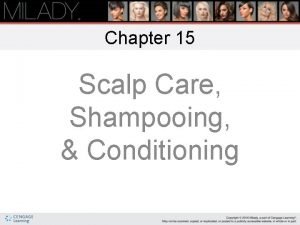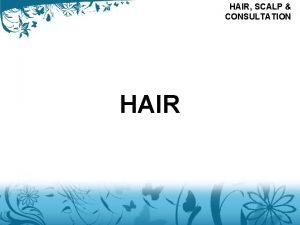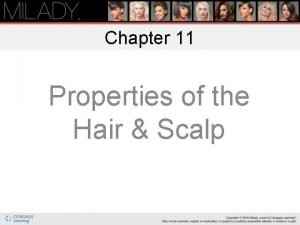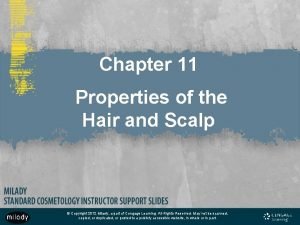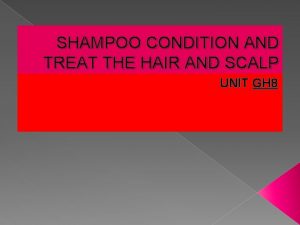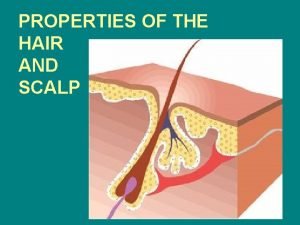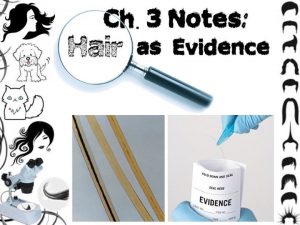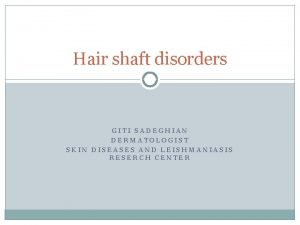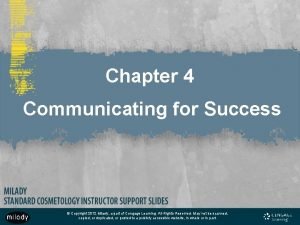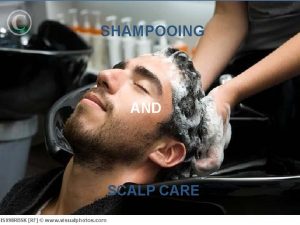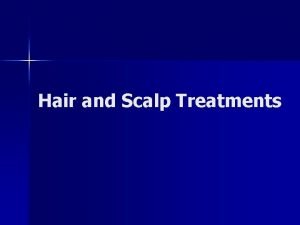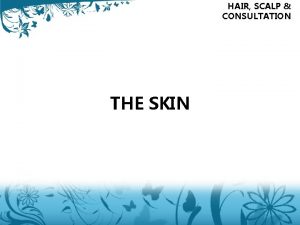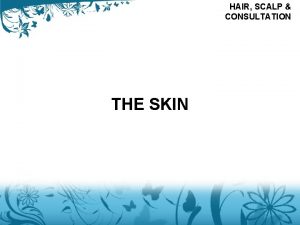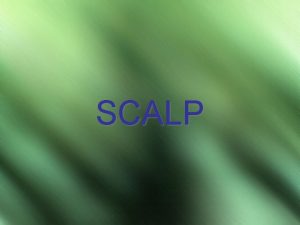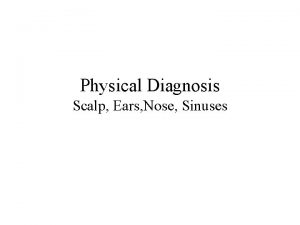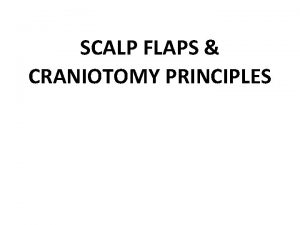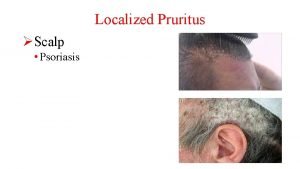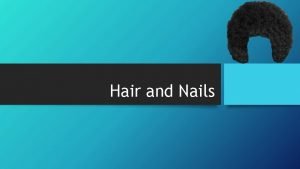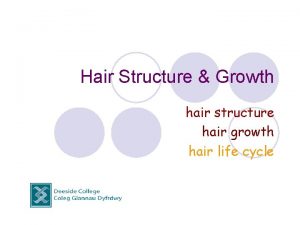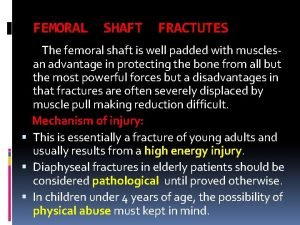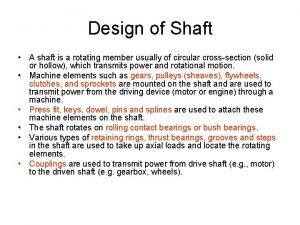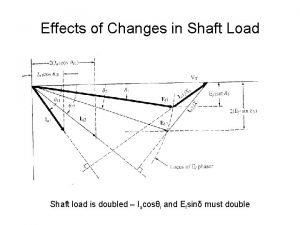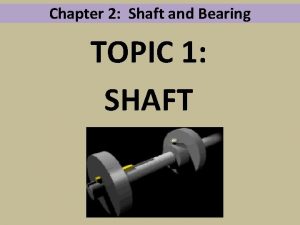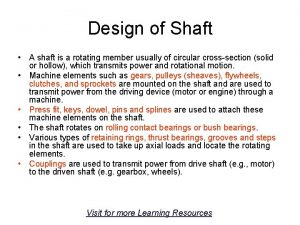HAIR SCALP CONSULTATION HAIR THE HAIR SHAFT THE



















- Slides: 19

HAIR, SCALP & CONSULTATION HAIR

THE HAIR SHAFT THE MEDULLA THE CORTEX THE CUTICLE

THE CUTICLE CLOSED OPEN

POOR CONDITION Chemicals enter OPEN CUTICLES Porous Poor cuticle condition

GOOD CONDITION CLOSED CUTICLES Resistant Chemicals cannot enter as easily Good cuticle condition

TASK 1 POROSITY TEST 1. Get into pairs and carry out an analysis of each others hair condition. 2. Look at the hair. 3. Listen and discuss previous treatments. 4. Feel the hair; this tells you a lot about the condition. 5. Carry out a porosity test. 6. Discuss the findings TAKE A FEW STRANDS OF HAIR AND WITH ONE FINGER & ONE THUMB SIDE DOWN TOWARDS THE SCALP. THE MORE RESISTANCE FELT, THE MORE POROUS THE HAIR.

TASK 2 Label the diagram and fill in the missing words from the list at the bottom of the page. The cuticle is made up of SEVEN to TEN layers of overlapping scales. These scales are TRANSLUCENT, like frosted glass, so that the hair colour can be seen through them. The cuticle is very tough and holds the whole hair together, but it may be damaged by HARSH CHEMICALS such as perms or bleaches or harsh treatments such as BACK BRUSHING. Answers: BACK BRUSHING, TEN, TRANSLUCENT, HARSH CHEMICALS, SEVEN.

THE HAIR TEXTURE IS DETERMINED BY THE AMOUNT OF CUTLCLE LAYERS FINE MEDIUM COARSE Very fine hair Average hair Very coarse hair

THE CORTEX REAL HAIR DRAWING

HAIR ELASTICITY POLYPEPTIDE CHAIN CORTIAL FIBRES LAYERS OF THE CUTICLE

PHYSICAL DAMAGE HAIR HAS BEEN SHEARED OFF CORTEX RIPPED THE START OF A SPLIT END

TASK 3 Look up elasticity test in the index page of your text book And complete the following sentence; How, why and when do you carry out an elasticity test?

TASK 4 (USE YOUR TEXT BOOKS TO HELP) The cortex is made from many strands or fibres, which are twisted together. These can stretch, and then return to their original length. Hair is made of a protein called KERATIN. Keratin itself is made of AMINO ACIDS, which are found in long coiled chains called POLYPEPTIDE chains. Various links and bonds hold these chains together. Temporary bonds are HYDROGEN bonds and SALT links. These break and rejoin whenever the hair is STRETCHED or DRIED into a new shape. Answers: HYDROGEN, KERATIN, POLYPEPTIDE, AMINO ACIDS, DRIED, SALT, STRETCHED.

TASK 4 continued (USE YOUR TEXT BOOKS TO HELP) Permanent bonds are called SULPHUR bonds; these are very strong and can only be broken by using PERMS or RELAXERS. The cortex also contains colour PIGMENT. These pigments are called MELANIN, which are brown and black, and PHEOMELANIN, which are YELLOW and RED. These can only be altered by permanent TINT or BLEACHED. The medulla is not always present in hair and does not have any real function Answers: MELANIN, BLEACHED, RELAXERS, YELLOW, PERMS, TINT, PIGMENT, SULPHUR, PHEOMELANIN.

TASK 5 IN GROUPS COMPLETE A LIST OF WHAT CAUSES DAMAGE TO THE HAIR ENVIROMENTAL PHYSICAL CHEMICAL

REGENERATION OF THE HAIR The regeneration of the hair is influenced by the following factors: • • • Health Diet Age Effects of disease Hormone balance • • • Heredity factors Climate Physical condition Chemical affects Non stress

TASK 5 Hair is grouped into the following types: • Caucasian (European) - Loosely waved or straight hair. • Negroid (African) - Tight, kinked, woolly, curled hair. • Mongoloid (Asian) - Coarse, straight, lank hair.

PH SCALE With the help of page 19 of your text book write the following onto the p. H scale below indicating where they would sit; • Bleach • Tint • Shampoo • Water • Hair & Scalp ACID NEUTRAL Then complete the following task ALKALINE

PH SCALE - TASK Look on the packaging to see if you can find the p. H value of these products or use the universal indicator paper. PRODUCT PRE PERM SHAMPOO COLLEGE SHAMPOO FROM HOME COLLEGE CONDITIONER 4 X 4 VITAMIN STYLING PRODUCT HAIR SPRAY FASHION FORM PERM SOLUTION NEUTRALISER TINT PEROXIDE WHEN COLOUR MIXED TINT REMOVER BLEACH WATER VALUE p. H ACID ALKALINE
 What are two most important requirements for scalp care
What are two most important requirements for scalp care Chapter 11 properties of the hair and scalp answers
Chapter 11 properties of the hair and scalp answers Three types of side bonds
Three types of side bonds Tinea capitis milady
Tinea capitis milady Hair worksheet
Hair worksheet What is a whorl in hair
What is a whorl in hair Cat cuticle pattern
Cat cuticle pattern Ringed hair
Ringed hair Triadic consultation model
Triadic consultation model Microslide consultation
Microslide consultation Wedding consultation form
Wedding consultation form Practice standards for consultation skills
Practice standards for consultation skills Stott davis model
Stott davis model Consultation collocation
Consultation collocation Pa osha consultation
Pa osha consultation Chapter 4 milady
Chapter 4 milady Neighbours consultation model
Neighbours consultation model Tgr portail en ligne
Tgr portail en ligne Consultation skills for pharmacy practice
Consultation skills for pharmacy practice Bradford vts consultation models
Bradford vts consultation models
